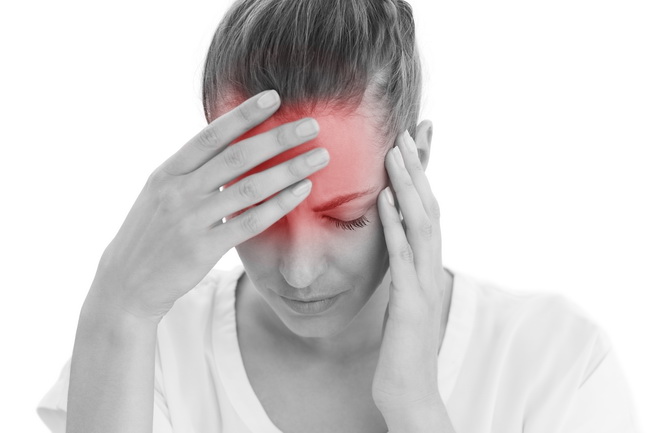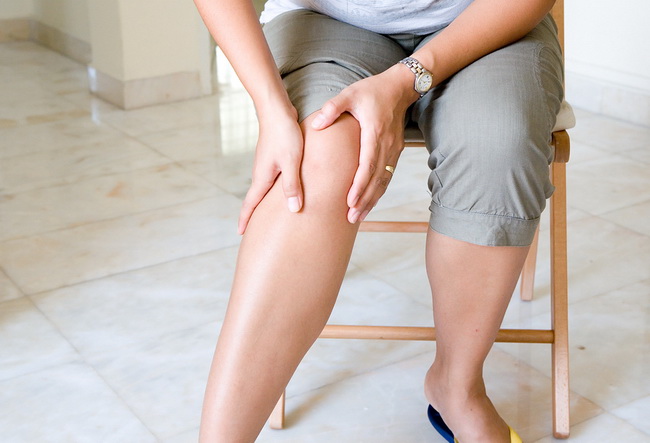- Make It Yourself Lavender Heart-Shaped Bath Bombs!
- 20 Things You Never Knew About “Down There”
- 12 Best Foods For Those Suffering From Arthritis Pain
- 12 Personal Hygiene Mistakes Almost Everyone Makes (Mom Never Told You About #4!)
- 15 Medicinal Plants And Herbs From The Cherokee People
- 12 Mind-Blowing Benefits Of Drinking Coconut Water During Pregnancy
- 12 Outstanding Winter Foods That Won’t Fatten You Up Like A Christmas Turkey
12 Types Of Pain You Should Never Ignore (Especially #9!)

Photo credit: bigstock.com
If you are like most people, you try to avoid going to the doctor for every little ache and pain. They can’t really do anything for those kinds of pains anyway and who wants to spend time sitting in the waiting room only to be told there is nothing they can do but come back if the pain gets worse?
Most people are in tune enough with their bodies that they know that their aching back is due to a weekend of helping your cousin move or the pounding headache they have is probably due to the kids being stuck inside the house all day.
The truth is that most minor aches and pains will go away on their own in two weeks or less. Anything lasting longer than that should be seen by a doctor.
However, there are some pains that you should never ignore or wait two weeks to see if they go away. They could be nothing, but on the other hand, they could be something very serious.
Take a look at the top 12 types of pain that you should never, ever ignore.
1. Back Pain and Numb or Tingling Toes
This combination could mean that you have a slipped or ruptured disc in your lower back. Some people feel a numbness or a tingling in their toes but others feel this in their butt, depending on which disc is giving you the trouble. This type of pain will not go away on its own. Try heating pads for 24 hours but if they do not help or if they help the pain but not the numb feeling, see a doctor right away. You can cause permanent nerve damage if you ignore this problem.
2. Unexplained, Persistent Pain in the Chest, Arm, Jaw, Throat, or Abdomen
Although most people know that chest pain, especially with pain that radiates down the left arm, could indicate a heart attack, but most people believe that this pain should be excruciating to be taken seriously. Even minor discomfort in the chest, arm, throat, belly, or jaw could indicate a serious heart problem. Doctors will tell you that many people mistake their first signs of pain as either simple stomach problems, such as indigestion, or intestinal problems, such as trapped gas. Cardiac problems often imitate acid reflux. If you have unexplained but on going pain in any of these areas, see your doctor as soon as possible to rule out heart issues. This is especially important for those in high risk groups such as women over 50, the overweight, or those with a family history of heart trouble.
3. Intense Tooth Pain That Wakes You Up
If you are sound asleep and you wake up suddenly with what feels like a very intense pain in the jaw, near the ear, you could be suffering from cluster headaches. This is an unexplained problem with the blood vessel that runs along the side of the head, next to the ear. There is also a nerve that runs very close to it. This nerve controls the feelings on one side of your face. For unknown reasons, soon after a person falls asleep, the blood vessel will suddenly engorge itself with blood, so much so that it touches that nerve, causing intense pain. Many people describe this pain on the same level, or worse, than childbirth. This tends to affect more men than women and generally strikes those over 40 years of age, but it can happen to anyone. There is no cure and over the counter pain killers are completely ineffective. This type of pain generally runs in cycles of 3 to 6 months. Your doctor can cut the cycle short with a 10 day prescription of the steroid prednisone. You will want to use this steroid as the pain is so intense that it has been known to drive some people to commit suicide rather than deal with it night after night.
Continue to Page 2

Photo credit: bigstock.com
4. Burning or Numbness in the Legs or Feet
A feeling that your feet or lower legs are on fire or if you find that your feet are numb and have little feeling in them could be a sign of neuropathy, specifically, diabetic neuropathy. There are about 23 million Americans who have diabetes and an estimated ¼ of them are undiagnosed, according to the American Diabetes Association. Other signs of diabetes are constant thirst or hunger, itchy, dry skin, cuts that are slow to heal, frequent urination, blurry vision and dry mouth. If you have any of the above symptoms in addition to numbness or a burning sensation in your feet or lower legs, see your doctor ASAP.
5. Menstrual Cramps that Don’t Respond to Medication
Although many women suffer from menstrual cramps, over the counter pain relievers should take care of the problem. However, if you still suffer from severe menstrual pain and the most common pain relievers don’t stop the pain, you might have endometriosis. This is a condition where the endometrial tissue continues to grow outside the uterus. This is quite common but it can lead to fertility problems, not to mention severe pain. You could also have a fibroid tumor, which is a non-cancerous growth that can occur inside or outside the uterus. Speak with your OBGYN about this issue so they can determine the source of the problem.
6. Excruciating Headaches
Although everyone suffers with headache from time to time, sometimes pretty severe ones, however there are other headaches that indicate a serious problem. Many headaches are due to tension or dehydration. Try a relaxing bath, taking a nap, and drinking several glasses of water. However, if you feel relaxed and are drinking water but you still have a screaming headache, especially one that started as what is known as a “thunderclap” headache, especially if you are vomiting, go to the emergency room. This could be a sign of bleeding in the brain, which requires immediate emergency care. If it turns out to be nothing, you know the old saying, better safe than sorry.
Continue to Page 3

Photo credit: bigstock.com
7. Dull Pain in the Lower Right Abdomen
This could be the beginning of appendicitis. This generally starts as a feeling of indigestion but quickly becomes a dull pain at the belly button, later moving to the lower right side. One good test is to sit in a chair and see if you can lift your right leg off the floor. If it is appendicitis, you won’t be able to do so without excruciating pain. Many people also break out in a cold sweat and double over in pain, unable to walk upright. Go to the emergency room immediately. If the appendix bursts, the bacteria will spread throughout the abdominal cavity. This is called peritonitis and it is a life threatening condition. Do not delay, go to the emergency room.
8. Sudden Back Pain or Nagging Back Pain
Almost everyone suffers from back pain at one time or another; sitting at the computer, working in the garden, or from an afternoon playing football with friends. Back pain is one of the most common complaints that doctors hear about and some people seem to suffer from it chronically. However, if you haven’t done anything to warrant a backache and you suddenly experience pain in the lower back or in the area between the shoulder blades, this could indicate a tear in the main blood vessel which runs to the heart, the aorta. This kind of tear is critical and needs emergency surgery. If you experience this kind of pain that you can’t explain away, especially if you suffer from hypertension, diabetes, circulatory problems, or if you smoke, go to the emergency room to rule this out.
9. Fever with Pain in the Middle Back
This could be your first sign of a kidney infection. This should be taken seriously, especially if you have a high fever, nausea, and/or vomiting. Although women are more prone to kidney infections than men, this type of infection, when it reaches this stage, is a serious infection that can cause permanent kidney damage. See your doctor ASAP.
Continue to Page 4

Photo credit: bigstock.com
10. Intense Abdominal Pain
A sudden, sharp, intense abdominal pain should be looked at by your doctor as soon as possible. Although there are several things that can cause this type of pain, none of them are good. Gallstones, or other types of gall bladder disease such as a stomach ulcer or intestinal ulcer, pancreatitis, or even an inflamed or burst appendix all first show themselves as intense pain in the abdominal area. None of the above are issues that can be ignored. You will need treatment, possibly even surgery, right away. See your doctor or go to the emergency room.
SEE ALSO: 12 Of The Best Super Foods To Fight Chronic Pain Fast!
11. Pain or Swelling in the Calves
Those annoying charley horse kind of cramps are painful but they go away within a few minutes. Leg cramps, or a general ache in the calf muscles that do not go away, especially when accompanied by swelling and a feeling of heat in the area of the pain, can indicate a blood clot. This type of blood clot is called deep vein thrombosis, or DVT. When a blood clot forms in one of the deep veins inside the leg and then the clot breaks off, it can travel to the lungs and become a pulmonary embolism. This can cause instantaneous death. If you have pain, swelling, or both, see your doctor ASAP to rule out DVT.
12. Vague, Odd, or Unexplained Pain
Sometimes, a combination of chronic, but subtle pain, that you can’t account for could mean there is a problem that runs deeper than skin and bone: depression. Most people never realize that depression causes pain but it most certainly does. Depression causes the body to send out strange pain signals. Depression is often the root cause of many “chronic” types of pain. If you have annoying pains that doctors can find no basis for, or a combination of pains that come and go for no apparent reason, you might have clinical depression. There are other symptoms of depression but speak with your doctor for a proper diagnosis before you try to self-medicate.
Always remember that pain is your body’s way of telling you that something is wrong. Any pain, even if you don’t see it listed here, that doesn’t go away and that you can’t explain should be investigated by your doctor.
References:





























